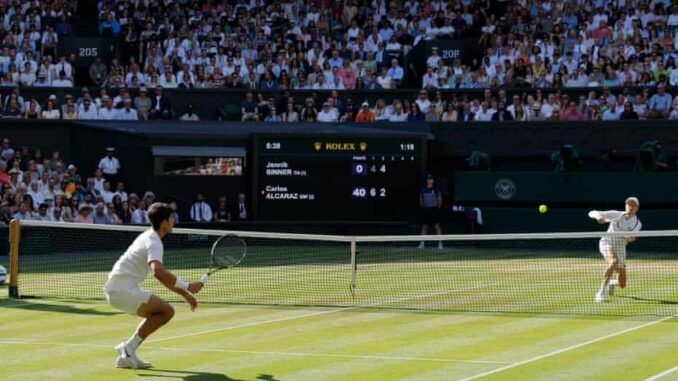
Grand Slam Chiefs Poised to Bend: Major Concessions on Table as Player Dispute Heats Up…Read More…
In a surprising shift that could redefine the landscape of professional tennis, the organizers of the Grand Slam tournaments appear ready to make significant concessions amid escalating tensions with top players. After months of simmering discontent over scheduling, prize money, player welfare, and governance transparency, the game’s most powerful tournament chiefs have finally acknowledged the need for compromise — a move insiders are calling “a watershed moment for the sport.”
The Grand Slam Board, representing the Australian Open, Roland-Garros, Wimbledon, and the US Open, convened a high-level emergency summit earlier this week in London. Sources close to the talks revealed that discussions were “intense but constructive,” with both tournament organizers and player representatives expressing a willingness to find common ground.
At the heart of the dispute are concerns raised by leading players and the Professional Tennis Players Association (PTPA), co-founded by Novak Djokovic and Vasek Pospisil. The players have consistently criticized the Grand Slam events for unilateral decisions on scheduling, prize distribution, and enforcement of tournament rules — often without meaningful player input.
The flashpoint came during the 2025 French Open, where a controversial late-night match schedule drew heavy backlash from players over health risks and recovery concerns. Several high-profile stars voiced frustration, citing the increasing demands of the tour, tighter turnarounds between matches, and growing mental health pressures.
“I love playing Grand Slams — they are the pinnacle of our sport — but we’re human beings, not machines,” said a top-10 player, speaking on condition of anonymity. “We can’t be expected to perform at our best under conditions that compromise our health. We’ve been asking for dialogue for years. It’s time they listened.”
Player advocacy groups pushed for a unified response, threatening a coordinated withdrawal from selected Grand Slam events if significant reforms were not made. While no formal boycott materialized, the threat was enough to send shockwaves through tournament leadership.
The response from the Grand Slam Board has been swift. In a joint statement released Wednesday, the Board acknowledged the players’ grievances and expressed a “firm commitment to a transparent and collaborative process moving forward.”
“We recognize the invaluable role players have in shaping the future of tennis,” the statement read. “Their voices deserve to be heard, and we are committed to working together on solutions that prioritize their welfare while preserving the integrity of our events.”
Among the key proposals reportedly on the table:
- Revised Match Scheduling: Grand Slam tournaments are considering stricter guidelines to limit late-night matches and reduce player recovery issues. Talks include setting earlier start times and capping the latest possible match conclusions.
- Prize Money Reallocation: There is ongoing discussion around increasing prize money for early-round matches to provide greater financial security for lower-ranked players, a long-standing issue raised by the PTPA.
- Governance Reforms: The Board has signaled openness to establishing a formal player advisory panel with decision-making input on tournament operations, a historic first if implemented.
- Mental Health Initiatives: Organizers have pledged to enhance on-site mental health resources and revise media obligations to better support players’ psychological well-being.
While these proposals are still under negotiation, the very fact they are on the table marks a dramatic departure from the often rigid stance of Grand Slam organizers in past disputes.
“This is a breakthrough we’ve been fighting for,” said PTPA co-founder Vasek Pospisil in a social media post. “It’s encouraging to see meaningful discussions happening. Players deserve respect and a seat at the table.”
However, not everyone in the tennis world is convinced of the organizers’ sincerity. Critics warn that without concrete action, the latest talks could be another example of placatory rhetoric aimed at defusing immediate tensions without addressing systemic issues.
“Words are cheap,” said former world No. 1 and now prominent coach Andy Roddick in a televised interview. “We’ve heard promises before. What matters is follow-through — real structural change, not just temporary fixes.”
For their part, the Grand Slam Board has committed to a follow-up summit with player representatives in August ahead of the US Open, signaling their intention to maintain dialogue beyond public statements.
Tennis analysts suggest that this episode may mark a turning point in the sport’s power dynamics. Traditionally, Grand Slam tournaments have held disproportionate sway over player schedules, earnings, and obligations. But with the rise of player-led associations and increasing public scrutiny over athlete welfare, the balance of power may finally be shifting.
“If the Grand Slams follow through with these reforms, it could herald a new era of shared governance in tennis,” said Mark Petchey, former ATP pro and commentator. “And that might just be the healthiest thing for the sport in decades.”
For now, players and fans alike watch with cautious optimism. The coming months will reveal whether tennis’s most iconic tournaments are genuinely ready to evolve — or if this is merely another volley in an ongoing battle for fairness and respect on the world’s biggest courts.
Leave a Reply